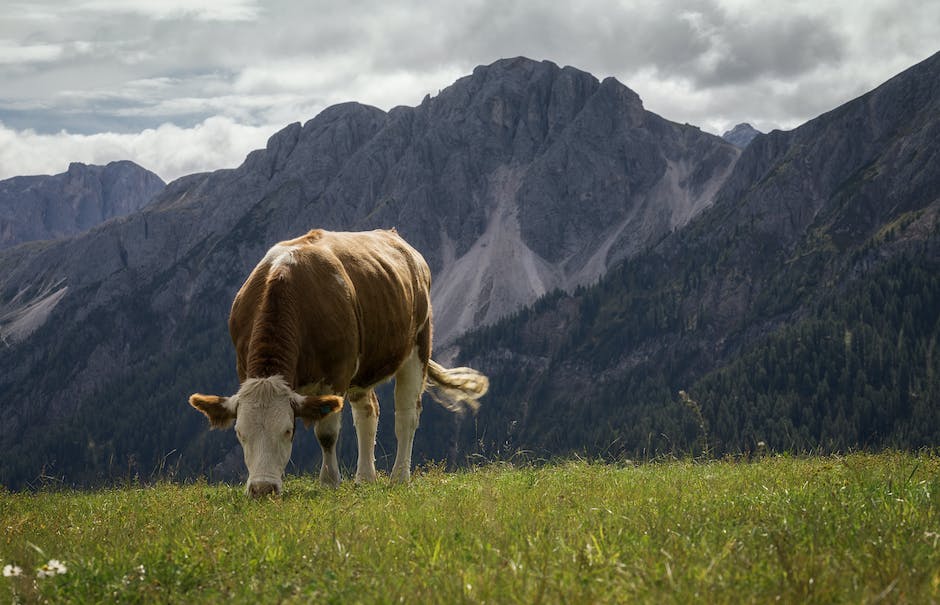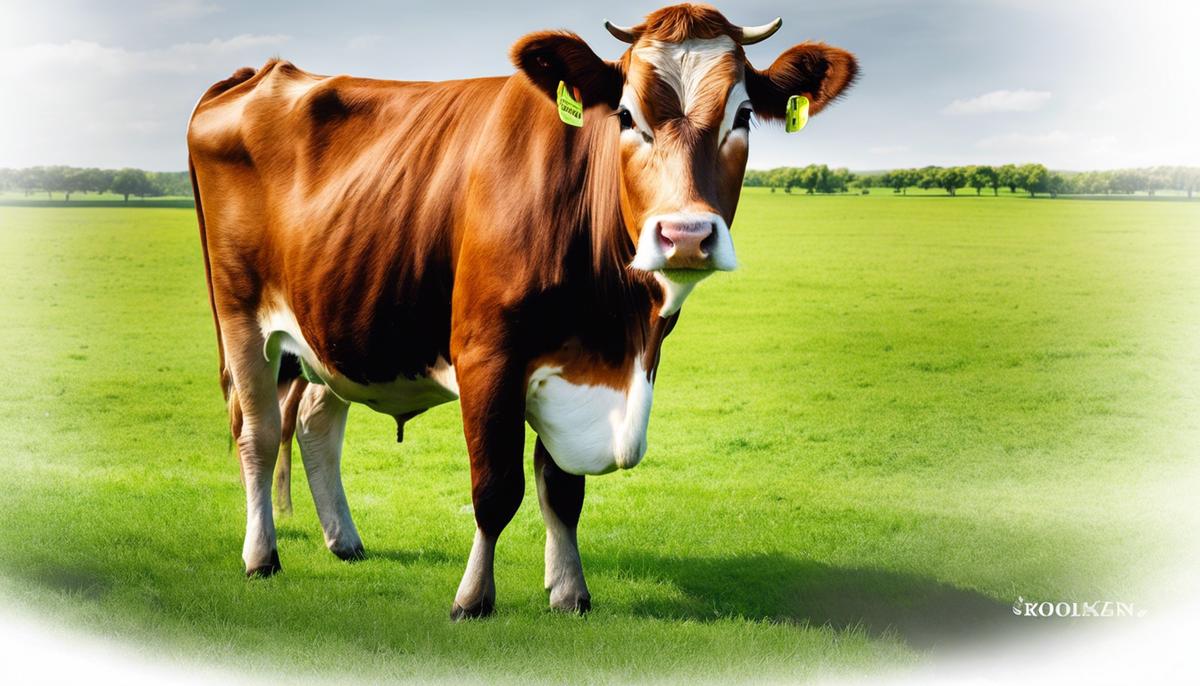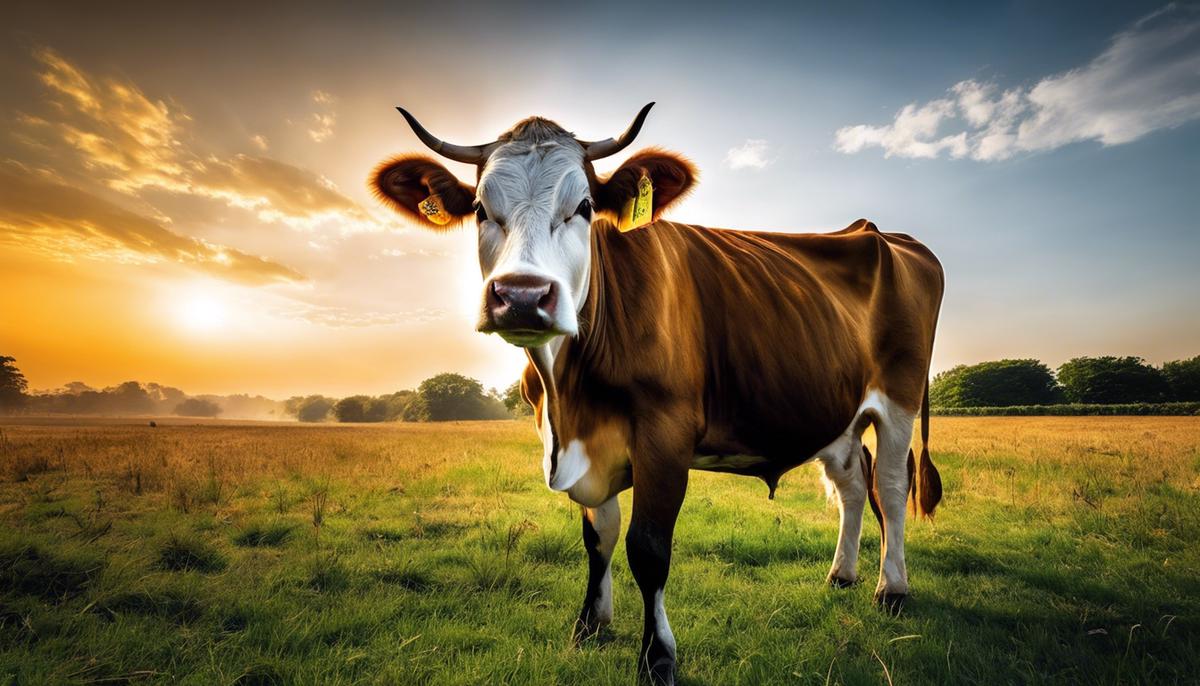

Agridisk
Egypt - Alexandria

Jersey Cows : Characteristics, Feeding & Farming System
Description: With their rich milk production and hardy nature, Jersey cows have long captured the interest and admiration of dairy farmers and enthusiasts around the world. These fascinating creatures boast a unique set of characteristics that not only make them a pleasure to care for but also contribute to their well-regarded status in the dairy farming industry. Beyond their physical attributes and temperament, we find a complex dietary system intricately tied to their productivity and the quality of milk they yield. Delve with us into the world of Jersey cow farming where we examine suitable systems, feeding regimes, and vital factors influencing their health and production. In this exploration, we will also tackle the inevitable challenges faced, equipping farmers with practical strategies for effective and humane Jersey cow farming. When one travels down the dairy aisle of a grocery store, they're met with a dazzling array of products- whole milk, skim milk, 2% milk. Behind these different offerings are dairy cows, the real heroes responsible for filling our glasses, cereal bowls, and coffee cups. Not all cows, however, are created equal when it comes to milk production. Among the various dairy breeds, Jersey cows stand out as one of the most unique and interesting ones. Let's delve in to unravel some fabulous facts about Jerseys, from their beginnings to their milk and their hardworking demeanor. Origins trace back to Jersey, a Channel Island situated near France. You'll find these cows aren't the biggest, but what they lack in size they surely make up for with their quality milk production. Sporting a light brown coat, Jerseys are often recognized due to their distinctive, doe-like eyes. Talk about punch packing! Despite weighing only about 900 pounds- smaller than many dairy breeds- Jersey cows possess the ability to produce large quantities of milk. This exceptional milk yield, combined with their lower feed intake, makes Jerseys an efficient breed. However, it's not just about the quantity of milk. When it comes to Jersey cows, the emphasis is unequivocally on quality. Their milk is renowned for its rich creaminess, boasting higher levels of butterfat and proteins – the stuff the best cheese and ice cream are made of. Their milk also stands out with its golden yellow hue, attributed to the extra carotene not converted into Vitamin A. That's why many believe Jersey milk is just a tad better tasting. Moreover, Jersey cows exhibit a robust nature that's hard to overlook. These resilient creatures can adapt to varying climates and are less susceptible to problems associated with heat stress. Their hardiness and resistance to disease are commendable traits that contribute significantly to their longevity. Then there’s the surprise element - these smaller cows might even outperform their larger peers in calf production! Jerseys generally have a higher fertility rate and calve more frequently than other dairy breeds. In addition, they have a shorter gestation period which combines with excellent fertility, making them an excellent source for steady production. Jersey cows exhibit a unique blend of characteristics that make them interesting and valuable to those in the dairy world. Not just a dairy breed, they are symbols of efficiency, resilience, and quality. So, the next time you pour a glass of milk, why not take a moment to appreciate these hard-working, high-yielding, golden milk producers. Do you know what makes a Jersey cow churn out some of the richest and creamiest milk you've ever tasted? It's all in the diet. As we step further into the Jersey world, let's unravel the fact that these remarkable bovines require a very particular diet to aid their unique ability in producing unrivaled quality milk. To fuel their high-volume milk production, Jersey cows need a balanced diet, focusing on energy, protein, fiber, minerals, and vitamins. Among these, energy and protein are particularly critical since high yields require considerable amounts. Energy sources can typically include grains, such as corn, barley, and oats. Note, caution is essential as excessive grain in the diet can result in metabolic disorders. So, it's essential to balance grain intake with adequate amounts of roughages like hay and silage, which are also fiber providers. Simultaneously, protein sources are significant for these bovines. High-quality legume forages, like clover and alfalfa, can provide the required proteins. Some farms also use manufactured protein supplements to ensure the right protein feeding levels. Minerals and vitamins, though required in smaller quantities, should not be overlooked. They're important for general health, immunity, fertility, and - you've guessed it - superior milk quality. Products such as mineral blocks can be made available to Jersey cows to lick at their leisure. Did you know that the Jersey girl's culinary preferences can influence the milk's final taste? Intriguing as it may sound, several farms have reported a sweet note to their milk when their Jersey cattle are fed apple pomace or dried citrus pulp. Optimum nutrition is not a one-off provision but a consistent practice. For Jersey cows, their nutritional needs oscillate in tune with their lactation cycles. The transition period, immediately before and after calving, signifies a crucial time when their dietary needs heighten. Lastly, water, the unsung hero, forms an integral part of the Jersey cow's diet too. A Jersey cow can consume anywhere between 30 to 50 gallons of water per day. This consumption aids digestion, nutrient absorption, and of course, milk production. There you have it—the magic recipe for a Jersey cow to produce the best quality milk. It's a fine dance between the right ingredients, perfect proportions, and consistent feeding, all while carefully heeding the impact on the milk's ultimate quality and taste. For the humble Jersey cow, it's not just about what you eat, but also when and how you eat it. Eating well truly does milk well! With this, we've come to the end of our discussion, but remember, keep exploring, for the world of Jersey is vast and exciting! As you venture further into the delightful world of raising Jersey cows, focusing on creating an optimal farming system becomes paramount. Now that you have gained a better understanding of Jersey cows' unique qualities, the next crucial step is how to efficiently care for them, mainly focusing on their diet and feeding practices. Achieving that perfect ratio of nutrients is essential for optimal milk production, health, and overall well-being of Jersey cows. Creating an optimal diet is akin to forming a fine-tuned symphony—the right balance of energy, proteins, fibers, minerals, and vitamins is crucial. Jersey cows' diets typically consist of grains as a significant energy source. However, avoid relying heavily on grains alone. It is like running a car just on high-grade gasoline; it might make the vehicle work, but the absence of necessary fluids could lead to unexpected breakdowns. Roughages—a blend of hay, silage, and pasture—provide indigestible material that promotes digestion and the absorption of other nutrients. Ensuring a well-balanced grain-to-roughage ratio aids digestion, leading to better milk production. Protein is another essential component, acting as building blocks for growth and milk production in Jersey cows. Keeping in mind that your Jersey cow has a smaller body mass, you need to ensure a protein-rich diet. This requirement can be fulfilled through forage legumes or manufactured protein supplements. However, take care not to overshoot the protein levels as too much could negatively affect your cow's health. Just like for humans, vitamins and minerals are vital for cow health and milk production. Calcium, phosphorus, and Vitamin D, directly impact the milk's quality, while trace minerals like selenium and copper regulate the overall health and immunity. Make sure to supplement your cow's diet with these elements as necessary, bearing in mind that more isn't always better. Believe it or not, water is the principal component of milk, making it a significant part of your cow's diet. Providing an ample, clean water supply, free from contaminants, is vital for lactation and the overall health of your cow. There's an undeniable mystique about Jersey cow milk. Some say that a Jersey's particular culinary tastes impact the flavor of their milk. While studies confirm the effect of diet on milk taste, the diversity in palate among Jersey cows remains an area of interest. Rest assured, by maintaining consistent feeding practices and allowing some leeway for your bovine's preferences, you'll likely maintain a steady and superior milk quality. One cannot underestimate the importance of taking care of a lactating Jersey cow's nutritional needs. During this time, their nutrient requirements spike and maintaining an adequate diet becomes even more critical. The transition period – three weeks before and after giving birth – requires special attention. A well-managed diet during this stage can lead to abundant, high-quality milk and assure the health of the new-born and the mother cow. In closing, creating the perfect symphony of nutrients for your Jersey cows is both an art and a science. Maintaining a balanced diet plays a pivotal role in the health and happiness of these resilient bovines, in turn enriching the quality and quantity of the milk they deliver. Jersey cows are not without their challenges, despite their many boons. However, farmers and enthusiasts should not find these obstacles offputting. They value their resilience and efficiency, in addition to their delectable milk. One key issue is their sensitivity to harsh climates. Primarily a creature of gentle climates, they are prone to experiencing heat stress in excessively hot weather. This not only affects milk production but also harms their overall health. Cooling strategies using sprinklers or fans and building barns or sheds with proper ventilation can help alleviate their discomfort. Somewhat contradictory to their tendencies against extreme heat, Jersey cows are also susceptible to lactation related hypothermia during colder months. They can lower their body temperature due to the energy exerted in milk production. To counter this, supplemental feeding must be provided to compensate for the increased energy need. Having a barn or shelter where cows can retreat during the coldest parts of the day is a must as well. Yet another challenge pertains to calving specificities. Despite their higher fertility rate, Jersey cows generally present a higher risk of dystocia or calving difficulties. This largely owes to the comparatively larger size of their calves. Farmers need to stay vigilant during the calving season and must be equipped with necessary veterinary assistance to minimize risks to both the calf and the cow. Notwithstanding the premium quality of their milk, Jersey cows also have a higher chance of having a high somatic cell count (SCC), indicating potential mastitis, an infection of the udder. In fact, cleanliness and hygiene are particularly important. Regular testing and monitoring, coupled with quality milking practices, can significantly reduce the risk. A well-balanced diet, too, can play a key role in boosting immunity. Jersey cows, like all livestock, are vulnerable to parasites - both internal and external. Proper grazing rotation, regular checks, and interventions such as de-worming are necessary to prevent major infections or infestations that can degrade their health and negatively impact milk production. In summary, while challenges exist in raising Jersey cows, they should not be considered barriers for those interested in partnering with these creatures. With the right knowledge, practical skills, and resources, these complications can be significantly mitigated, proving Jersey cows to be a viable and rewarding venture. Next up we'll discuss the miracle of crossbreeding Jerseys, and how this age-old practice can enhance the advantages and address weaknesses of this beloved breed. Keep that mouse scrolling, dear readers! Jersey cows, with their endearing personalities and bountiful milk production, have endeared themselves to farmers and dairy enthusiasts worldwide. Through a comprehensive understanding of their unique attributes, optimal feeding practices, and suitable farming systems, we can unlock their full potential while ensuring their well-being. Despite the challenges that may emerge in the course of Jersey cow farming, armed with preventative measures and potential solutions, these hurdles can become learning opportunities for improved dairy operations. At the journey's end, the reward isn't just in the high-quality dairy produced; it's knowing we play a responsible role in nurturing these charming creatures to thrive and prosper.Jersey cows : characteristics, feeding & farming system
Characteristics of Jersey Cows

Feeding Jersey Cows
Designing a Supreme Diet for the Quintessential Jersey Cow: Unlocking the Secret of Ultra-Rich Milk

Farming Systems for Jersey Cows
Stepping Beyond the Jersey Cow Basics
Dissecting the Diet of Jersey Cows
The Protein Potion
Micro-Minutiae Matter: Minerals and Vitamins
Wet or Dry? Balancing the Water Intake
Holistic Health – Not Only for Humans
Lactation and The Transition Period
Challenges and Solutions in Jersey Cow Farming
Addressing Challenges for Promising Jersey Cows
